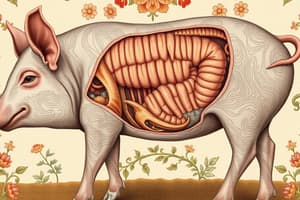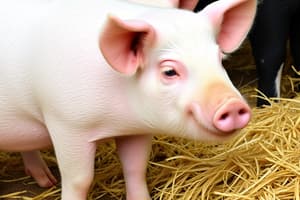Podcast
Questions and Answers
What is the primary causative agent of swine erysipelas?
What is the primary causative agent of swine erysipelas?
- Staphylococcus aureus
- Bacillus anthracis
- Listeria monocytogenes
- Erysipelothrix rhusiopathiae (correct)
What age group of pigs is most susceptible to erysipelas?
What age group of pigs is most susceptible to erysipelas?
- Less than 1 month
- 1 to 3 months
- 3 months to 3 years (correct)
- Over 3 years
How long can Erysipelothrix rhusiopathiae survive in the environment?
How long can Erysipelothrix rhusiopathiae survive in the environment?
- 7 days
- 14 days
- 21 days
- 35 days (correct)
Which clinical sign is pathognomonic for swine erysipelas?
Which clinical sign is pathognomonic for swine erysipelas?
What can increase the incidence of erysipelas in pigs?
What can increase the incidence of erysipelas in pigs?
Which of the following statements about the organism's entry route is true?
Which of the following statements about the organism's entry route is true?
What is a common outcome of increased severity of lesions in swine erysipelas?
What is a common outcome of increased severity of lesions in swine erysipelas?
What occurs when swine are exposed to turkeys and sheep regarding erysipelas?
What occurs when swine are exposed to turkeys and sheep regarding erysipelas?
What clinical sign is associated with chronic cardiac insufficiency?
What clinical sign is associated with chronic cardiac insufficiency?
Which bacteria is identified as the causative agent of Exudative Epidermitis?
Which bacteria is identified as the causative agent of Exudative Epidermitis?
What is the primary treatment for chronic erysipelas in pigs?
What is the primary treatment for chronic erysipelas in pigs?
What is a common diagnosis method for acute disease in pigs?
What is a common diagnosis method for acute disease in pigs?
What indicates a longer duration of immunity after vaccination?
What indicates a longer duration of immunity after vaccination?
Which method is most effective for recovering organisms during an acute disease?
Which method is most effective for recovering organisms during an acute disease?
What should be included in general sanitation for prevention and control?
What should be included in general sanitation for prevention and control?
Which joint is commonly affected by chronic proliferative nonsuppurative arthritis?
Which joint is commonly affected by chronic proliferative nonsuppurative arthritis?
What is a common clinical sign associated with photosensitization?
What is a common clinical sign associated with photosensitization?
Which of the following is NOT a recommended treatment for photosensitization?
Which of the following is NOT a recommended treatment for photosensitization?
What type of stressor can lead to tail biting in pigs?
What type of stressor can lead to tail biting in pigs?
Which area is least affected by biting in pigs?
Which area is least affected by biting in pigs?
What is an effective method to prevent biting in pigs?
What is an effective method to prevent biting in pigs?
Which pharmaceutical can act as a photosensitizing agent?
Which pharmaceutical can act as a photosensitizing agent?
What treatment is typically recommended for biting behaviors in pigs?
What treatment is typically recommended for biting behaviors in pigs?
Environmental enrichment is an important factor in preventing which behavioral issue?
Environmental enrichment is an important factor in preventing which behavioral issue?
Which age group of piglets is primarily affected by exudative epidermitis?
Which age group of piglets is primarily affected by exudative epidermitis?
What is the primary cause of mortality in exudative epidermitis?
What is the primary cause of mortality in exudative epidermitis?
Which of the following is NOT a clinical sign of exudative epidermitis?
Which of the following is NOT a clinical sign of exudative epidermitis?
Which treatment is recommended for exudative epidermitis?
Which treatment is recommended for exudative epidermitis?
What is the referral diagnosis that can be confused with exudative epidermitis?
What is the referral diagnosis that can be confused with exudative epidermitis?
Which bacterium is commonly isolated for the confirmatory diagnosis of exudative epidermitis?
Which bacterium is commonly isolated for the confirmatory diagnosis of exudative epidermitis?
What is a preventative measure against exudative epidermitis?
What is a preventative measure against exudative epidermitis?
What causes the greasy exudate observed in lesions of exudative epidermitis?
What causes the greasy exudate observed in lesions of exudative epidermitis?
What is the primary cause of mange cases in swine?
What is the primary cause of mange cases in swine?
What is the estimated reduction in farrowing rates in affected swine herds?
What is the estimated reduction in farrowing rates in affected swine herds?
What are the effects of sarcoptic mange on growth rates from weaning to slaughter?
What are the effects of sarcoptic mange on growth rates from weaning to slaughter?
Which of the following conditions is NOT a mode of transmission for sarcoptic mange?
Which of the following conditions is NOT a mode of transmission for sarcoptic mange?
Which clinical sign is commonly associated with acute sarcoptic mange?
Which clinical sign is commonly associated with acute sarcoptic mange?
What is the life cycle duration of Sarcoptes scabei var.suis?
What is the life cycle duration of Sarcoptes scabei var.suis?
How are neonatal piglets commonly affected by sarcoptic mange soon after birth?
How are neonatal piglets commonly affected by sarcoptic mange soon after birth?
What is a common diagnostic method for identifying sarcoptic mange in pigs?
What is a common diagnostic method for identifying sarcoptic mange in pigs?
Flashcards are hidden until you start studying
Study Notes
Swine Erysipelas
- Caused by Erysipelothrix rhusiopathiae, a Gram-positive bacillus that can survive in the environment for 35 days.
- Occurs in pigs, sheep, and turkeys, with 30-50% of healthy swine acting as carriers.
- Zoonotic potential leading to erysipeloid in humans.
- Stressors such as high temperatures, dietary changes, and chronic low aflatoxin exposure increase disease incidence.
- Susceptibility peaks in pigs aged 3 months to 3 years; exposure to turkeys and sheep raises the risk.
- Organism spreads through contaminated feed, feces, or cuts and can enter via tonsils and digestive tract lymphoid tissue.
- Symptoms range from acute, with sudden death and skin lesions, to chronic, with potential heart complications such as endocarditis.
Clinical Signs
-
Acute Signs:
- Sudden death in market-weight pigs.
- Fever (104°F), cyanosis of skin, particularly on the snout, ears, and abdomen.
- Pathognomonic rhomboid or diamond-shaped skin lesions, more visible on light-colored pigs.
- Lameness due to joint swelling and reluctance to stand.
- Pregnant sows may experience abortions.
-
Chronic Signs:
- Cardiac insufficiency, including exercise intolerance and respiratory distress.
- Joint enlargement observed three months post-infection.
Diagnosis
- Based on clinical symptoms and necropsy findings, including widespread hemorrhages and necrosis during acute phases.
- Bacterial culture from kidney, spleen, blood, or joints, with failure to recover not excluding disease.
- Molecular methods like PCR can also confirm diagnosis.
Treatment and Prevention
- Treatment: Penicillin is the first choice, with alternatives including tetracyclines and tylosin.
- Chronic erysipelas lacks effective treatments.
- Prevention: Focuses on sanitation, disinfectants, and vaccinations (bacterins or attenuated live), typically given twice yearly to breeding stock and to piglets at 3 months and again 3 weeks later.
Exudative Epidermitis (Greasy Pig Disease)
- Caused by Staphylococcus hyicus, affecting piglets under 8 weeks.
- Requires predisposing factors like trauma for disease development.
- Characterized by severe skin erosion, exudate accumulation, and possible septicemia.
Clinical Signs
- Signs include listlessness, brownish-black exudate that mats hair, and excessive secretion without pruritus.
Diagnosis and Treatment
- Diagnosed through clinical signs and isolation of S. hyicus.
- Treatments include antibiotics, antiseptic rinses, and multivitamins.
- Control measures emphasize isolation of affected pigs and maintaining hygiene to prevent outbreaks.
Mange
- Caused by Sarcoptes scabei var.suis, prevalent in swine herds and transmitted through direct contact and close pen arrangements.
- Affects all age groups, especially after being moved into infested areas.
Clinical Signs and Pathogenesis
- Acute cases show intense pruritus and dermatitis, especially in the ears, rump, and abdomen, leading to growth reduction.
- Mites burrow into the skin, intensifying irritation and allergic reactions.
Diagnosis and Control
- Diagnosis is made through visual signs and skin scrapings.
- Treatment involves reducing sunlight exposure and possibly using topical treatments.
- Preventative measures focus on housing standards and avoiding stressors.
Biting
- Stress, boredom, and environmental factors lead to various biting behaviors affecting tails, flanks, and ears.
- Treatment includes identifying and removing offending pigs and providing topical treatments for wounds.
Prevention and Control
- Tail docking, reducing stressors, and ensuring adequate feed and water provisions help mitigate biting behaviors.
- Maintain good air quality and minimize environmental stressors due to temperature changes or overcrowding.
Photosensitization
- Special consideration for white-skinned areas exposed to sunlight brings potential skin necrosis and pruritus.
- Exudation followed by drying and skin lesions, requiring supportive treatment and avoiding sunlight exposure.
Studying That Suits You
Use AI to generate personalized quizzes and flashcards to suit your learning preferences.




